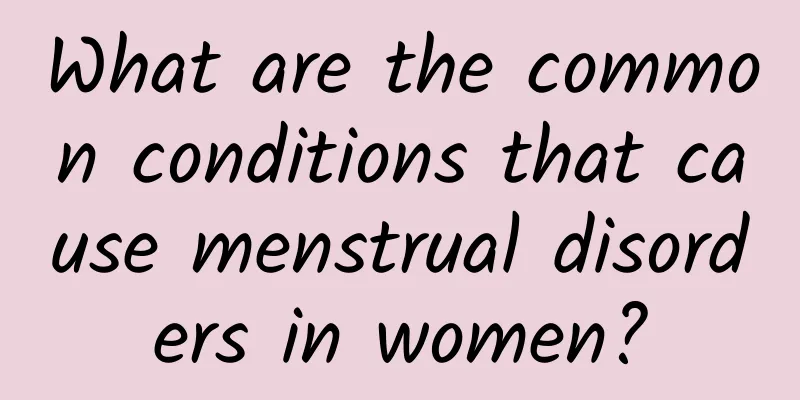Why do I have low blood pressure and dizziness due to uterine fibroids? Why do I have high blood pressure due to uterine fibroids?

|
Why does uterine fibroids cause low blood pressure and dizziness? Why does uterine fibroids cause high blood pressure? Uterine fibroids are a common gynecological disease, and their occurrence will have a certain impact on women's quality of life. However, some patients find that they have low blood pressure, dizziness and other discomfort symptoms after suffering from uterine fibroids, while others have high blood pressure. So, why do uterine fibroids cause low blood pressure and dizziness, while some people have high blood pressure? Next, we will interpret this issue from two aspects. 1. Causes of dizziness due to low blood pressure: 1.1 Insufficient blood supply: Uterine fibroids will occupy the uterine cavity or myometrial space, resulting in insufficient blood supply to the uterus, which will cause insufficient blood supply to the patient. Insufficient blood supply will cause insufficient oxygen and nutrients to various parts of the body, causing patients to experience dizziness. 1.2 Changes in hormone levels: Uterine fibroids produce certain hormones, such as estrogen. Changes in hormone levels may have a certain impact on the body's blood pressure regulation, causing patients to have low blood pressure. Unstable hormone levels may also cause disorders in the nervous system, leading to symptoms such as dizziness. 1.3 Concurrent anemia: Uterine fibroids can cause irregular vaginal bleeding or menorrhagia, which can lead to anemia. Anemia symptoms can cause the patient's blood pressure to drop, resulting in insufficient blood supply to the body, which can cause dizziness, fatigue and other discomfort symptoms. 2. Causes of high blood pressure: 2.1 Increased androgen levels: Some patients with uterine fibroids may experience elevated progesterone levels, and androgens can increase blood pressure to a certain extent. Therefore, these patients may experience symptoms of elevated blood pressure. 2.2 Neuroendocrine imbalance: Uterine fibroids can affect the patient's endocrine system and cause nervous system disorders. Nervous system disorders can have a certain impact on the regulation of blood pressure, making it possible for blood pressure to rise. 2.3 Metabolic abnormalities: Some patients with uterine fibroids may have metabolic abnormalities, such as diabetes, etc. Metabolic abnormalities can lead to increased glucose levels in the blood, which in turn can cause increased blood pressure. In summary, the main reason why uterine fibroids cause low blood pressure and dizziness is due to insufficient blood supply, changes in hormone levels, and concurrent anemia; while high blood pressure due to uterine fibroids is due to increased androgen levels, neuroendocrine imbalance, and metabolic abnormalities. For patients with different symptoms, doctors should develop personalized treatment plans based on the patient's specific situation to improve the patient's quality of life. |
>>: What are common uterine fibroids? Is it normal to have uterine fibroids?
Recommend
What medicine to take for cervicitis
Cervicitis is one of the common gynecological dis...
What exercises can relieve vulvar itching?
Vulvar itching is a common gynecological disease ...
Let me explain the causes of vulvar leukoplakia
Vulvar leukoplakia is a chronic disease among gyn...
Does hyperprolactinemia require long-term medication?
Hyperprolactinemia is a disease with a very high ...
What causes cervical hypertrophy?
What causes cervical hypertrophy? Experts say: Ce...
I couldn't help having sex 10 days after the abortion.
After an abortion, the female body needs some tim...
What is a cervical cyst?
What is a cervical cyst? 1. The medical name of c...
What is the pathological knowledge of menopause?
Menopause is usually the permanent cessation of p...
Three reasons for irregular menstruation in women
Irregular menstruation is a common phenomenon dur...
Proper diet during menstrual cramps
Women experience pain in the lower abdomen and lu...
Daily care after ovarian cystectomy
Ovarian cystectomy is suitable for patients with ...
What should I do if my period is not over after 19 days?
What should I do if my period is not over after 1...
If you want to lose weight quickly, should you do aerobic exercise first or build muscle strength first?
"Eat less and exercise more" is the 4-w...
Eating lotus root in autumn can strengthen the spleen and stomach ~ People with bloating and diabetes should not eat too much lotus root
Autumn is the season for tasting fresh lotus root...
Several situations that require uterine fibroid surgery
Uterine fibroid surgery is also one of the common...









